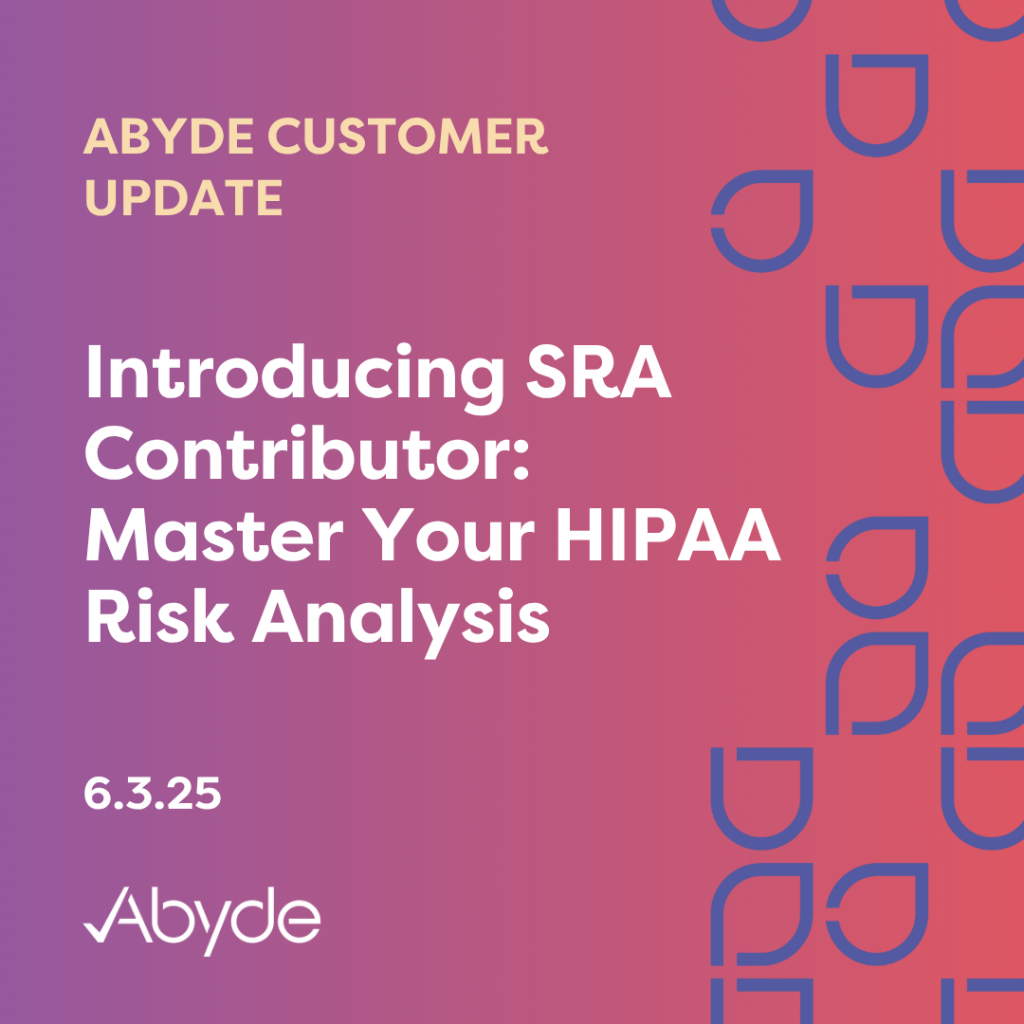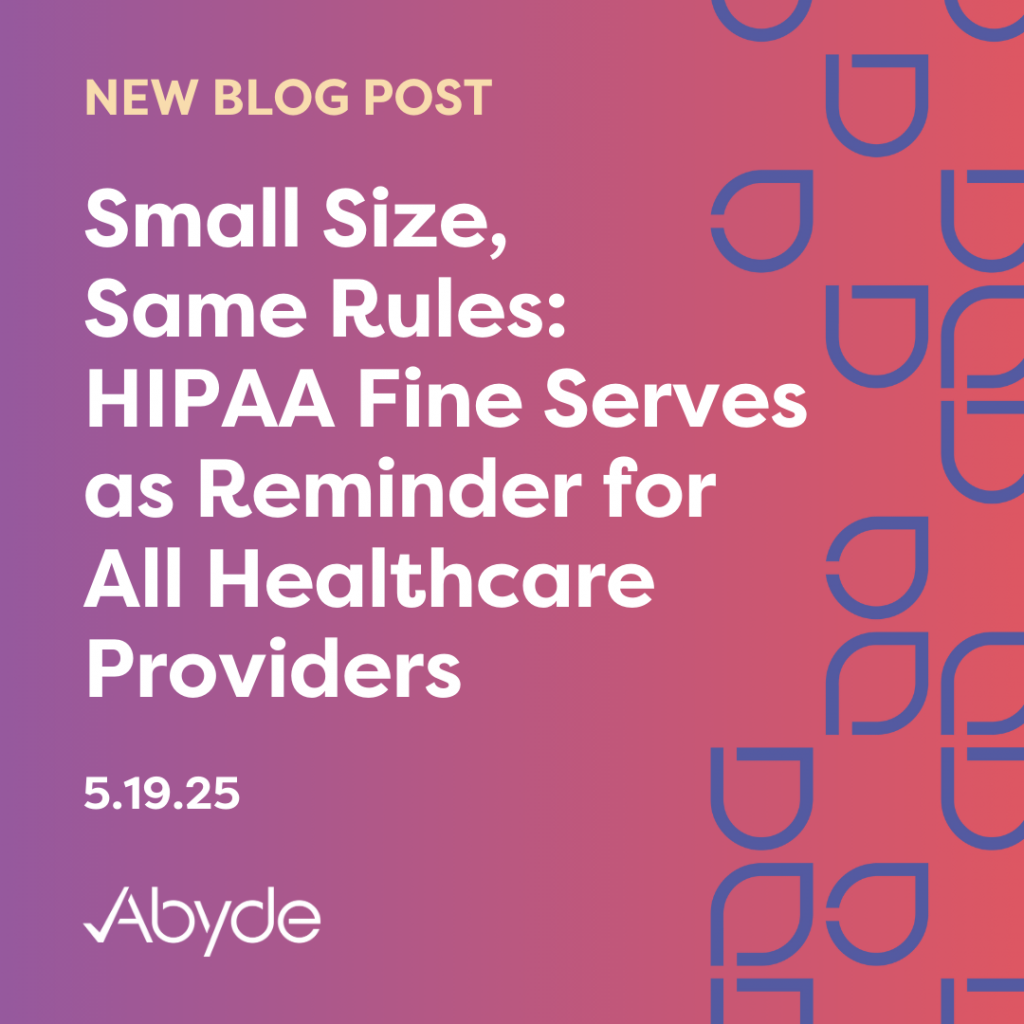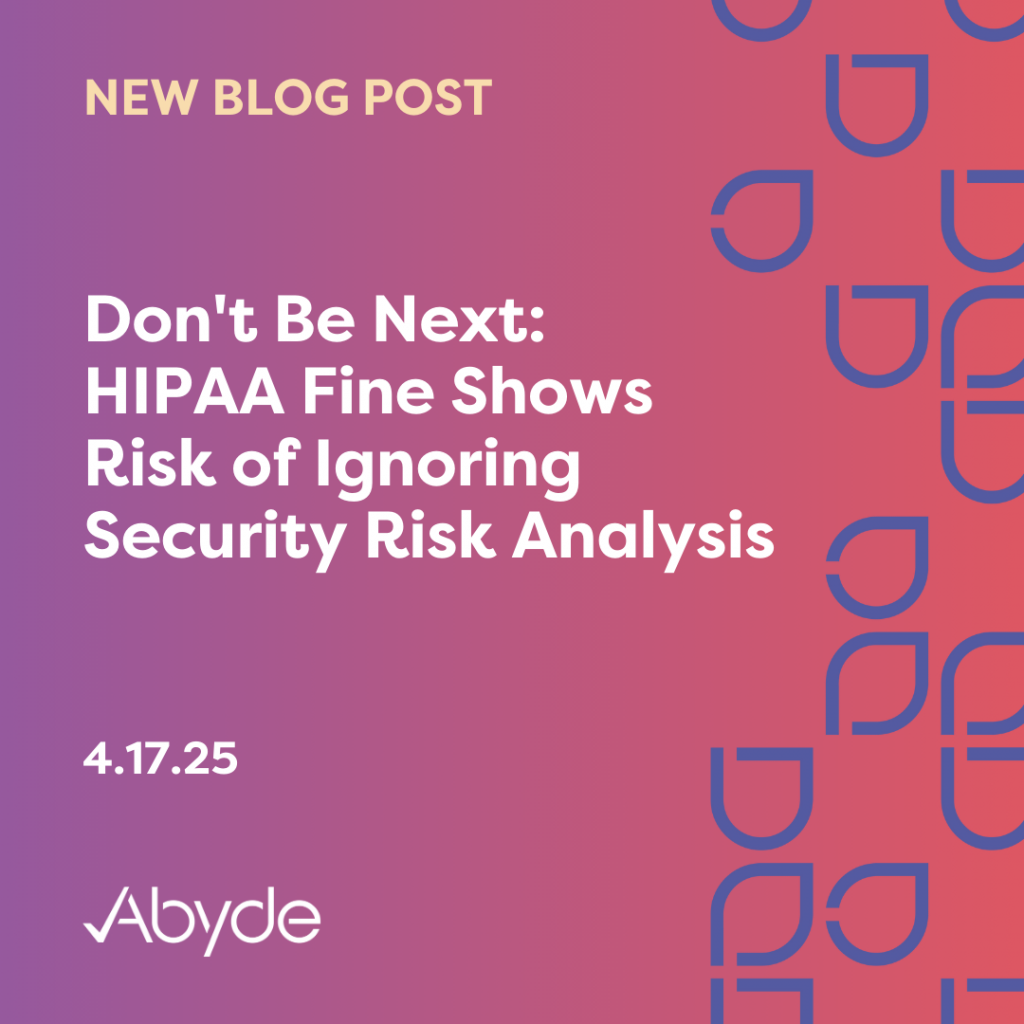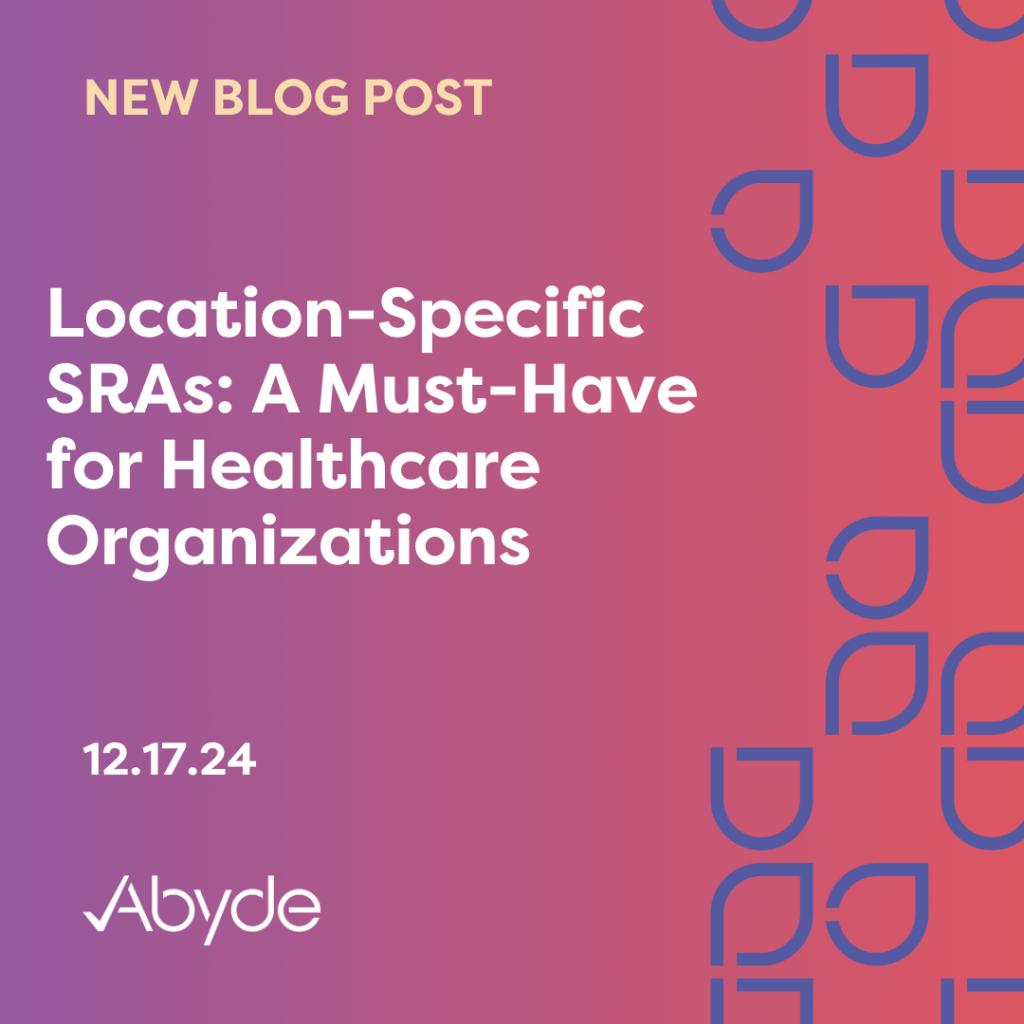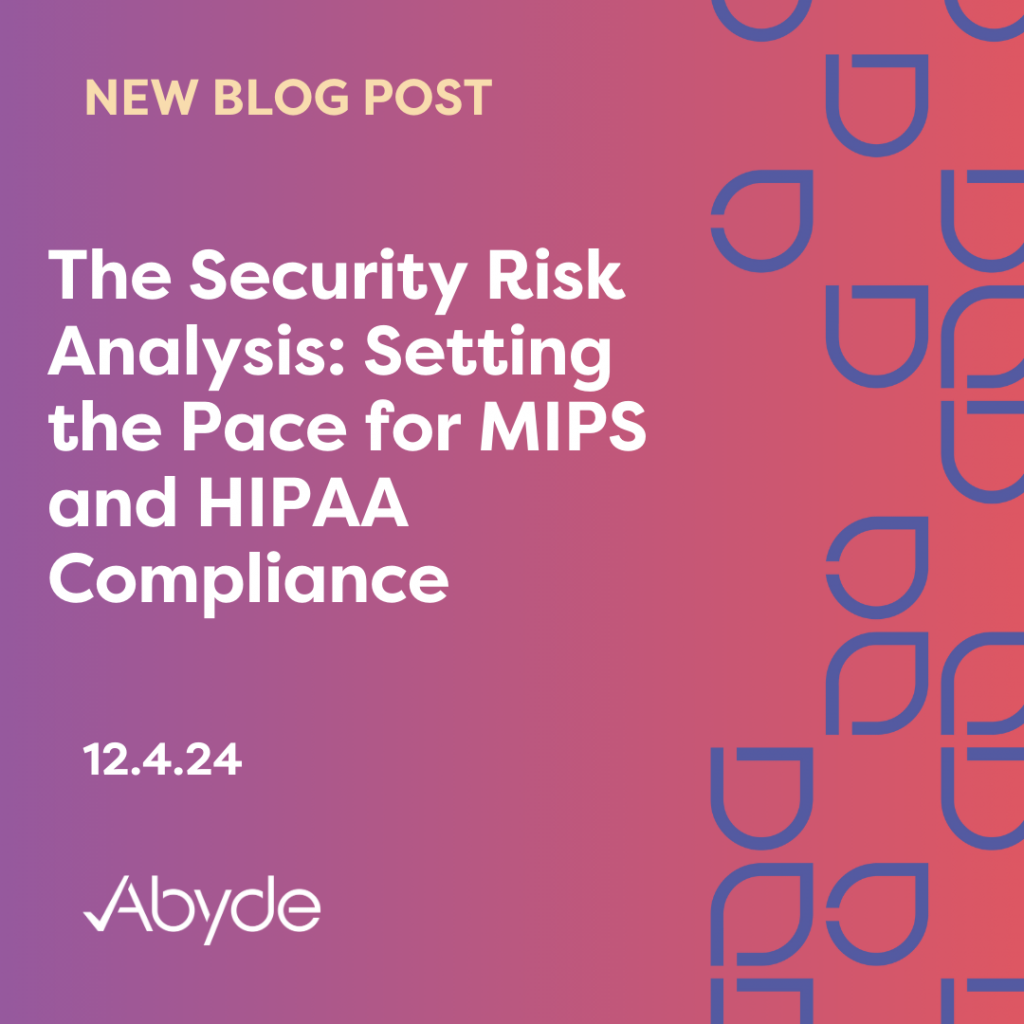June 3, 2025 Have you ever been stumped by a HIPAA Security Risk Analysis (SRA) question because you didn’t know the answer? Even the most seasoned HIPAA Compliance Officers encounter administrative and technical security questions outside their area of expertise, and that’s completely normal. Remember, you’re not expected to have all the answers. So, how are you supposed to get the right answers for the questions you don’t know from those who do? Abyde’s latest update, SRA Contributor, helps you get the necessary answers. This feature allows you to send questions internally to other Abyde users (at your practice) or externally to trusted contacts of your Business Associates (BAs), allowing you to complete your SRA confidently. The Users section has now been updated to include both Users and Contributors. Once in this section, click the SRA Contributor tab to add external individuals, such as your IT partner, who can assist in answering SRA questions. Then, complete the SRA. We encourage users to mark uncertain questions with ‘Don’t Know’. Once the SRA is complete, Abyde users can access the SRA Contributor feature from their Scorecard module and securely send any questions as needed. Hit the Abyde Flag icon to the right of any question on your Scorecard to activate the SRA Contributor pop-up and select your Contributors. As a reminder, you can add a note to any question for your Contributors. Once flagged, the question(s) are batched and ready to be sent. Abyde recommends reviewing any and all questions for Contributors and sending them in one batch to reduce the number of emails. After all questions are flagged, send them together by hitting the send icon on the Contributor line below the question or from the global SEND button at the top of the Scorecard module. Once sent, your SRA Contributors (and other Abyde users) will receive an email to the secure SRA Contributor Portal. The Contributor Portal includes all flagged questions. Your Contributors can answer your questions, add notes, and send their responses to you once they complete the portal. From there, you will receive an email notification that your question has been answered and is ready for review. Then, you can either reject or approve an SRA Contributor’s answers. If approved, their answer and note (if present) replace your initial response on the SRA. If rejected, you can send the question again to other contributors or manually change the answer yourself. SRA Contributors’ answers and Contributor Portal links (if they never answered the question) can also be deleted from the Scorecard by clicking the Trash Can icon. Why This Matters A thorough and accurate Security Risk Analysis (SRA) is paramount for safeguarding patient data and ensuring compliance. It is the foundation of a compliant practice. The SRA Contributor enables you to complete the SRA more efficiently and confidently, enhancing collaboration with your business associates and other Contributors who manage the more technical aspects of your practice. This ensures that the required SRA is completed accurately and thoroughly, giving you confidence in the integrity and completeness of your answers. To learn more, contact our support team at support@abyde.com, or call 1.877.816.1620.
Small Size, Same Rules: HIPAA Fine Serves as Reminder for All Healthcare Providers
May 19, 2025 HIPAA compliance is not just a recommendation; it’s a requirement, no matter how small your organization is. The latest HIPAA fine is a testament to this, with Vision Upright MRI the latest practice to be penalized. The small California MRI center experienced a significant breach, which exposed several violations in the fallout. Acting Office for Civil Rights (OCR) Director Anthony Archeval emphasized the widespread cybersecurity risks, noting that these threats impact healthcare providers of all sizes: “Cybersecurity threats affect large and small covered healthcare providers.” Vision Upright MRI was fined $5,000 and will now face a two-year Corrective Action Plan (CAP), being monitored by the OCR. This fine showcases that no practice, big or small, must be followed to keep patient data safe. What Happened? At the end of 2020, Vision Upright MRI experienced a breach in its systems due to an insecure server. This cybercrime exposed over 21,000 patients’ medical images, leading to the OCR’s investigation. The investigation discovered that the MRI center had never completed a Security Risk Analysis (SRA). The SRA thoroughly examines a practice, reviewing all current safeguards to secure Protected Health Information (PHI). These safeguards can include physical barriers the practice has implemented, like locked doors and alarms, and the administrative techniques the practice follows, like routinely checking access to sensitive patient data. The SRA is critical for a compliant practice and should be completed annually and after any breaches. While the SRA is a fundamental requirement for a practice, it is unfortunately often overlooked. The OCR has implemented a Risk Analysis Initiative to ensure practices are completing this requirement, and has reinstated the audit program, reviewing if regulated entities are maintaining this document. In addition to missing the SRA, Vision Upright MRI did not properly notify affected parties within 60 days, violating the Breach Notification Rule. The Breach Notification Rule requires practices to notify patients within 60 days of discovering a breach, regardless of how many were impacted. This short timeline allows patients to take the necessary precautions for the safety of their data. The practice should also provide credit monitoring. Since this event impacted well over 500 patients, the threshold to consider the situation a large breach, Vision Upright MRI also needed to notify the media and the OCR within a 60-day timeline. Communicating this is imperative, allowing the OCR to swiftly begin its investigation and potentially affected patients to receive information through media channels. These serious missteps led to the monetary settlement and years of government monitoring. Streamlining HIPAA Compliance Even a small practice doesn’t require overwhelming resources to be HIPAA compliant. The right compliance program can simplify HIPAA compliance. With smart solutions, the SRA can be completed easily, reviewing questions and potential vulnerabilities the practice faces. Additionally, breaches can be reported in intelligent software, with compliance experts assisting practices through alerting patients and the OCR. Meet with an expert today to learn how to automate your compliance program.
Don’t Be Next: HIPAA Fine Shows Risk of Ignoring Security Risk Analysis
April 17, 2025 Let’s make this clear: The Security Risk Analysis (SRA) is at the foundation of a compliant practice. The SRA is the proactive assessment of your practices’ physical, technical, and administrative safeguards. Physical safeguards include alarms, codes, and other procedures or devices your practice might deploy. Technical safeguards involve cybersecurity protocols, like firewalls, antivirus software, encryption, and other security measures. Lastly, the administrative safeguards are your practice’s actions, such as using visitor IDs, maintaining a sign-in sheet, or even posting about patients on social media. The latest HIPAA fine is another reminder of the importance of the SRA in protecting patient data. This is the sixth Risk Analysis Initiative enforcement since the end of last year. The Office for Civil Rights (OCR) is serious about ensuring that practices know this requirement. This focus has remained consistent even during administration transitions. Said best by OCR Acting Director Anthony Archeval, “A failure to conduct a risk analysis often foreshadows a future HIPAA breach.” What Happened? Northeast Radiology, P.C. (NERAD), a healthcare provider specializing in medical imaging clinical services in New York and Connecticut, experienced a significant breach that exposed nearly 300,000 patients’ Protected Health Information (PHI). The breach, which occurred from April 2019 to January 2020, was caused by unauthorized individuals accessing radiology images of patients due to a compromised server. When the OCR began investigating the practice in March 2020, it was discovered that NERAD did not have an SRA. Due to the absence of this document and the sheer size of the breach, the organization was fined $350,000 and will undergo a two-year Corrective Action Plan (CAP). Completing an SRA NERAD’s HIPAA settlement with the OCR is a clear reminder that your practice needs to complete an SRA long before a breach occurs. While an SRA might seem daunting, addressing problems before patients’ information is at risk is much easier. Completing this risk assessment can help your practice identify vulnerabilities before they escalate into compliance issues. While the SRA mandates practices to analyze and review existing procedures thoroughly, this process doesn’t need to be overwhelming or costly. With smart solutions, your practice can answer simple questions about your practice while the software intuitively builds out an SRA report, analyzes the current situation, and provides recommendations to mitigate potential risks. To learn more about how your practice can streamline the SRA, schedule a consultation with an expert today.
Location-Specific SRAs: A Must-Have for Healthcare Organizations
December 17, 2024 Keeping all locations in line with HIPAA regulations can be quite a challenge, especially when managing a multi-location practice. It’s a complex puzzle that requires careful attention to detail and a proactive approach to ensure compliance across the board. And we hate to break it to you, but a blanket Security Risk Analysis for your organization isn’t enough. A Security Risk Analysis, or SRA, is a thorough review of your organization’s physical, administrative, and technical safeguards to protect patient data. Even when you’re managing compliance at a single location within a multi-location organization, you are responsible for ensuring an SRA is completed for your location. The Office for Civil Rights (OCR) is serious about this requirement, as indicated by a recent significant fine. A penalty of over $500,000 was recently announced for the Children’s Hospital of Colorado system. While this investigation was sparked by a phishing attack, one of the major findings was missing SRAs for all locations. Completing this SRA is imperative. As the OCR spearheads new enforcement and initiatives, it’s time to get compliant. What is a SRA? The SRA is an in-depth review of everything your practice does to ensure patient data is safe. This means everything from whether your practice utilizes alarms and codes on doors to the servers you use and even how your staff handles patient intake, like how the sign-in sheet process works. The SRA is the first step of a compliant practice because it allows you to review your vulnerabilities and make changes to uphold your commitment to keeping data safe. The SRA is also a requirement for MIPS. Unfortunately, the SRA is a commonly missed requirement for medical practices. In fact, 86% of all practices could not show an adequate SRA in the last round of random HIPAA audits. Completing a sufficient Security Risk Assessment (SRA) is essential for maintaining a compliant medical practice. This process is closely linked to the Office for Civil Rights (OCR) Risk Analysis Initiative, which mandates that medical practices and organizations carry out this required assessment. Recently, the Bryan County Ambulance Authority was fined $90,000 for failing to conduct an SRA, marking the first enforcement action under this new initiative. This incident demonstrates the OCR’s commitment to this initiative and its dedication of resources to ensure compliance. Importance of Location-Specific SRAs When conducting a SRA, assessing every location within your organization is vital. While performing a single SRA for the entire entity might seem easier, compliance is more intricate and requires ongoing attention rather than being a one-off endeavor. Each location has distinct vulnerabilities that must be acknowledged and addressed. For instance, one location might have different vendors than another, and another location might be in an older building, with different security to keep Protected Health Information (PHI) safe. Although some overarching requirements may come from the main location, capturing each site’s specific conditions is essential. This thorough documentation demonstrates that every location takes compliance seriously, addresses vulnerabilities, and keeps patient data safe. How to Complete an SRA With the right resources, managing and completing an SRA for a multi-location practice can be simplified. Organization is key: ensuring each location completes all SRAs and can be easily accessed in a centralized location. Your organization can efficiently complete this requirement by having a tailored set of questions for each location. To learn more about streamlining your multi-location SRAs for your organization, schedule a consultation with a HIPAA expert today.
The Security Risk Analysis: Setting the Pace for MIPS and HIPAA Compliance
December 4, 2024 As a healthcare provider, tackling your daily to-do list probably feels like running a marathon without a finish line at times. You’re tasked with managing a successful business, keeping up with ever-changing legislation and new technology while ensuring that your top priority of patient care never falls behind. Despite the challenging course, there’s a benefit to keeping pace with both quantity and quality. Providers are rewarded for going the extra mile thanks to Value-Based payment programs like MIPS and other government incentives like the HIPAA Safe Harbor Law. What is MIPS? You’ve most likely heard of the Merit-based Incentive Payment System (MIPS) and might already be a participant in it. Whether it’s a Quality Payment Program or new legislation passed into law, the government continually emphasizes the importance of being proactive rather than reactive and providing incentives for doing so. This is why it’s valuable to know whether your organization is eligible to participate in government programs (you can check here). Many of these different program requirements align with the standards your practice already has to meet under HIPAA law—protecting your patients, checking off compliance requirements, and receiving incentives can often be done all in one stride. To take a quick step back, MIPS is one of two payment tracks under the Medicare Quality Payment Program. The Centers for Medicare and Medicaid Services (CMS) uses this system to measure eligible clinician performance and reward high-value, low-cost care. MIPS participants can receive a payment adjustment to their Medicare reimbursements based on their performance scores across four different categories: Quality: The type of care you deliver based on specific measures of performance. Promoting Interoperability: Focuses on patient engagement and electronic exchange of information using Electronic Health Record (EHR) technology to improve patient access to their health information and exchange of information between providers. Improvement Activities: Your participation in clinical activities that work towards improving care coordination and patient engagement and safety. Cost: Assesses the cost of care you provide in relation to your Medicare claims. The Importance of the Security Risk Analysis (SRA) Before you can engage with the various performance measures, you must first meet a prerequisite for participating in the MIPS Promoting Interoperability performance category. This requirement is crucial not only for achieving HIPAA compliance but also for benefiting from other government incentives: the Security Risk Analysis (SRA). Conducting an SRA involves evaluating any potential risks to your organization’s electronic Protected Health Information (ePHI) and implementing necessary security updates and safeguards to address any identified vulnerabilities. Your organization must complete an SRA at least once a year to comply with MIPS and HIPAA standards. Additionally, it’s important to review and update the assessment regularly throughout the year to reflect any changes in your processes. Getting Compliant for MIPS Beginning your compliance journey can be overwhelming, but it is essential to take advantage of government initiatives such as MIPS. Intelligent software solutions can help keep your practice on track by outlining the requirements for HIPAA compliance and offering a streamlined SRA that meets MIPS standards. To learn more about how to become compliant for MIPS, schedule a meeting with a compliance expert today.
SR-Hey, Have You Conducted a Security Risk Analysis?
July 28, 2023 In the ever-evolving landscape of healthcare, the safeguarding of sensitive patient information is of paramount importance. To protect patient privacy and maintain health data integrity, the Health Insurance Portability and Accountability Act (HIPAA) sets stringent standards for compliance. One of the vital components in achieving HIPAA compliance is conducting Security Risk Analyses (SRAs). Understanding HIPAA and its Compliance Requirements HIPAA, enacted in 1996, is a landmark piece of legislation designed to protect the privacy and security of patients’ health information. The regulation establishes a set of rules that healthcare providers, health plans, and other covered entities must follow to ensure the confidentiality and integrity of patients’ protected health information (PHI). Failure to comply with HIPAA can lead to severe consequences, including hefty fines and reputational damage. But we all knew that, right? What is a Security Risk Analysis (SRA)? Now this is what we need to know! A Security Risk Analysis systematically evaluates an organization’s information technology infrastructure, policies, and procedures to identify potential vulnerabilities and risks to the confidentiality, integrity, and availability of PHI. An SRA aims to assess the organization’s current security measures, identify weaknesses, and implement necessary safeguards to mitigate risks effectively. Why is an SRA Important for HIPAA Compliance? Identifying Vulnerabilities: An SRA helps healthcare organizations identify potential vulnerabilities in their systems and processes that could lead to unauthorized access or disclosure of PHI. By understanding these weaknesses, organizations can take proactive measures to address them before any security breach occurs. Preventing Data Breaches: Data breaches in healthcare can expose sensitive patient information, leading to significant legal and financial consequences. Conducting an SRA helps preemptively prevent data breaches by bolstering security measures and ensuring compliance with HIPAA’s Security Rule. Mitigating Risks: Risks in healthcare are constantly evolving due to new cybersecurity threats and technological advancements. Regular SRAs allow organizations to stay ahead of potential risks and adopt measures to mitigate them effectively. Tailoring Security Measures: Each healthcare organization has unique systems and processes. An SRA helps identify specific security needs and allows the organization to tailor security measures to address its individual risks effectively. Demonstrating Compliance: HIPAA compliance requires organizations to conduct regular SRAs. By documenting assessments, organizations can demonstrate their commitment to safeguarding patient data, which is essential during audits and investigations. Improving Security Posture: SRAs are not just a checkbox exercise; they provide valuable insights into the organization’s overall security posture. Based on the analysis results, organizations can continually implement improvements to enhance their security measures. Legal and Reputational Protection: A data breach can tarnish an organization’s reputation and erode patient trust. By conducting SRAs and implementing robust security measures, healthcare entities can enhance their legal and reputational protection. At Abyde, we take a distinctive approach to SRAs by offering a personalized and tailored experience for you and your practice. Think of our SRA module as your dedicated companion, guiding you through the process of identifying vulnerabilities specific to your practice. Recognizing that each practice is unique, our intuitive software will present only the questions relevant to your business as you respond. This streamlined approach is one of the many ways we ensure simplicity and effectiveness in achieving your compliance goals. The protection of patient data is not only a legal obligation but also an ethical responsibility for healthcare organizations. HIPAA compliance is critical in ensuring that patient information remains secure and confidential. Regular SRAs are an indispensable aspect of HIPAA compliance, allowing organizations to identify vulnerabilities, prevent data breaches, and mitigate risks effectively. By investing in security measures and staying proactive in their approach, healthcare organizations can reinforce patient trust and safeguard the integrity of their services in today’s increasingly digital healthcare landscape.
